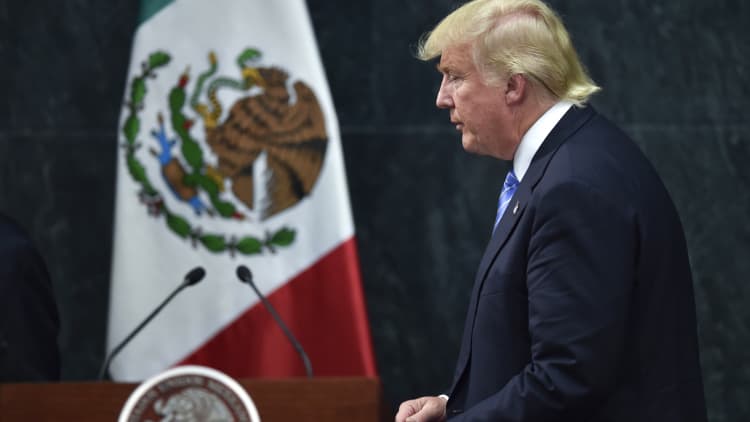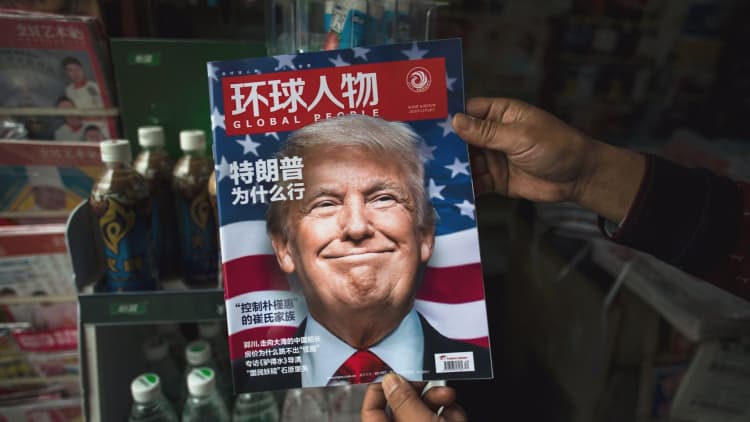
President Donald Trump's tough stance against Mexico could make it easier for China to become the country's — and Latin America's — top trade partner.
"The U.S. trade tensions with Mexico are putting the Mexican government on overdrive trying to find new export markets," said Sean Miner, fellow at the Atlantic Council, a Washington-based think tank, who noted that 80 percent of Mexican exports go to the U.S. "Recently, China and Mexico have become closer. Clearly this is a consequence of the rising tensions."
On Jan. 27, Trump threatened to send U.S. troops into Mexico, accusing Mexican President Enrique Pena Nieto of not doing enough to "a bunch of bad hombres down there." He did not identify the hombres or why they are bad.
Earlier that week, Trump appeared to have warmed up to the idea of a border-adjusted tax plan proposed by House Republicans. Such a plan would tax imports into the United States, and exclude exports from taxes.
Fearing that trade with the U.S. may be restricted by policies implemented by the Trump administration, Mexico has been looking to lessen its economic dependence on its big neighbor to the north. Chinese and Mexican officials met on Dec. 12, pledging to deepen ties between the two countries.
In fact, Mexico's Giant Motors, which is partly owned by Mexican billionaire Carlos Slim's Grupo Financiero Inbursa, and Chinese auto maker JAC Motor will invest more than $200 million to manufacture SUVs in Mexico, Hidalgo State Governor Omar Fayad told reporters at a news conference last week.
"This automobile will proudly carry a label that will say 'Made in Mexico,'" Fayad said, according to The New York Times. "And that should be a cause for great pride for the people of Hidalgo."
Trump has slammed U.S. automakers for so much as planning to manufacture cars south of the border. Ford Motor said Jan. 3 it will invest $700 million in its Flat Rock, Michigan, plant — and add 700 new jobs — rather than build a $1.6 billion plant in Mexico. The announcement came after Trump bashed the company for shipping jobs outside the U.S., though CEO Mark Fields said the decision to cancel the Mexican facility was made because of low market demand.
But it is not just Mexico looking to strengthen economic ties with China. Other Latin American nations may give China a bigger economic beachhead in the Western Hemisphere.
What is happening is — because of the death of the [Trans-Pacific Partnership] — countries want to strengthen regional trade agreements.Sean Minerfellow, Atlantic Council
Chinese Foreign Minister Wang Yi said in October that China wants a feasibility study for a free trade agreement with Colombia. If the two countries agree on a deal, Colombia would join Peru, Chile and Costa Rica among Latin American countries that have bilateral trade agreements with China.
"What is happening is — because of the death of the [Trans-Pacific Partnership] — countries want to strengthen regional trade agreements" and "they're going to look at many other avenues that exclude the U.S." said Atlantic Council's Miner.
The Trans-Pacific Partnership was a multination trade deal spearheaded by the United States — and excluding China — but which was canceled by Trump after he assumed office. The end of the TPP has prompted China to try to seize advantage of the vaccuum left by a retrenching United States, according to economists.
China had already been quietly increasing its economic influence in Latin America well before the TPP's demise and Trump's shocking election win. According to Americas Society/Council of the Americas, a New York City–based nonprofit organization, trade between China and Latin American countries rose 24-fold between 2000 and 2013. Trade between the United States and Latin America roughly tripled between 1996 and 2016, according to U.S. Census Bureau data.
Mexico makes 'a lot of the stuff that China makes'
However, increased trade between China and Latin America faces limitations for now.
"If China wants to take the lead in Latin America … that's good. Now, the question is: Are there complementarities between Latin America and China? Right now, the U.S. and Latin America have more than China and Latin America," said Alberto Ramos, head of Latin American Economics at Goldman Sachs. "Why doesn't Mexico trade with China? Because they make a lot of the stuff China makes."
Ramos added that trading between Latin America and China is more difficult logistically, given the distance between the two regions.
As for China, "I don't think the Latin America option is a very strong one," said Nick Lardy, senior fellow at the Peterson Institute for International Economics.
Lardy noted that the U.S. alone accounts for 20 percent of Chinese exports, while the entire Latin America region takes in just 6 percent. China "can always seek out other options, but I don't think Latin America is a very good one," he said, adding that if a trade war between the U.S. and China erupts, it would adversely affect China and would make it harder for the country to expand into other markets.
There is also another problem, said Atlantic Council's Miner: "China sells a lot more than it buys."
China remains a net exporter of goods despite its efforts to pivot its economy to a more consumer-driven one. "The Chinese are in a transition, but this shift from an export-based economy into a more consumer-driven economy is taking quite a long time," Miner said.
— Reuters contributed to this report.
WATCH: Why Trump's foreign policy is on a collision course in the South China Sea



